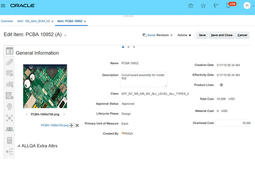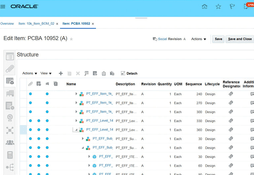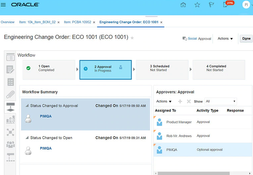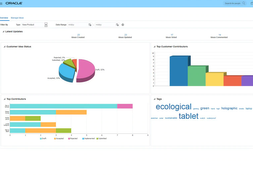Oracle Cloud PLM
3 Reviews 4.5/5 ★ ★ ★ ★ ★A Product Lifecycle Management (PLM) system by Oracle for engineering and manufacturing companies. Formerly Oracle Agile PLM.
Product Overview
Oracle Cloud PLM is a product lifecycle management solution that streamlines workflows and improves decision-making throughout the product lifecycle. It centralizes product data, enhancing collaboration and information sharing across teams. Its key features include innovation management, product development, quality management, product master data management, and configurator modeling. Additionally, it aims to reduce costs and scale effectively to accommodate business growth, backed by security features.Pros
- Configurable using low-code embedded solutions.
- Integrates customer feedback with product insights.
- Embedded analytics.
- Quarterly updates
Cons
- Customizations may require deeper technical expertise.
- Reports not readily structured for Excel, complicating graph generation
Target Market
Large-scale enterprises and organizations in highly regulated industries that require comprehensive lifecycle management and detailed compliance tracking.Video Overview
Key Features
Innovation Management
- Maintain profitable innovation
- Evaluate idea proposals and capture new ideas from multiple sources
- Manage requirements and concepts
- Build innovation portfolios
Quality Management
- View product quality across the entire supply chain
- Closed-loop quality processes
- Streamline preventative actions that are integrated with product development
- Centralized document management
Product Master Data Management
- Omnichannel commerce with SCM and ERP integrations for consistent product info
- Item mastering through synced applications
- Product commercialization
Product Development
- Develop and launch products efficiently
- Track part references and maintain a single view of suppliers
- Minimize design costs
- Track product lifecycles to ensure compliance
- Change management
- Integrate with CAD systems
Configurator Modeling
- Model complex products
- Add high-level questions to streamline sales
- Apply templatized design
Pricing
- Starts at $350/month/user
- 10 user minimum
Product Overview
Developer Overview
Related Products
User Reviews of Oracle Cloud PLM
Write a Review- Health Care Providers & Services
- 1K-5K employees
- Annual revenue $1B-$10B
We found it very rigid
We are operating on Oracle Agile for our PLM needs and when we received the update that they were sunsetting Agile, we of course viewed the most practical next step was to move to Oracle Cloud PLM. However after doing a demo of the system we found it very rigid. Our business requires us to be able to customize across BOMs and engineering reports, something Agile was great at. With the Cloud PLM, it did not offer the same customizable features, and we found we would be left with numerous workarounds. We have since begun exploring outside of Oracle’s PLM offerings.
Employees can search for ideas and collaborate quickly
I’ve implemented Oracle PLM and can keep all ideas captured internally and externally in a central repository so they can be easily analyzed, assessed, and prioritized.
Employees can search for ideas and collaborate on ideas quickly and easily. There is a built-in social network to collaborate and use dashboards to visualize analytics to make fast well-informed decisions.
One of the key advantages to having the Oracle PLM cloud
One of the key advantages to having the Oracle PLM cloud is having that data and process in one place.
NBTY is in the business of wellness. We hold ourselves to high standard. We chose Oracle because we were able to configure it to our needs and connected to our existing PLM system.









